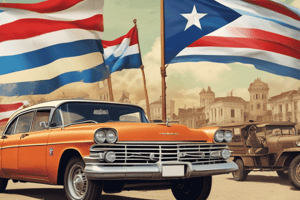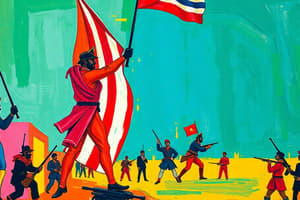Podcast
Questions and Answers
What was a significant obstacle for the Grant Administration regarding Cuba?
What was a significant obstacle for the Grant Administration regarding Cuba?
- The number of black Cubans in the population (correct)
- The lack of support from US investors
- The presence of European powers in the region
- The influence of Spanish culture on Cuban society
What happened to the canal project in Panama led by Ferdinand de Lesseps?
What happened to the canal project in Panama led by Ferdinand de Lesseps?
- It led to the bankruptcy of the company due to high worker fatalities. (correct)
- The project was taken over by the US government and finished later.
- It was temporarily halted due to financial constraints.
- It was completed successfully and became a major route.
Which was a key military development in the early 1890s for the US?
Which was a key military development in the early 1890s for the US?
- Forming alliances with European nations
- Building a modern Navy with rebuilt battleships (correct)
- Establishing a military base in Central America
- Acquisition of new territories in the Caribbean
What was the purpose of the first Pan American Conference in 1888?
What was the purpose of the first Pan American Conference in 1888?
Who is noted for introducing the idea of Pan Americanism during the 1890s?
Who is noted for introducing the idea of Pan Americanism during the 1890s?
What does expansionism refer to in the context of U.S. territorial policies?
What does expansionism refer to in the context of U.S. territorial policies?
Which of the following best describes imperialism as mentioned in the content?
Which of the following best describes imperialism as mentioned in the content?
What is a defining characteristic of neo-colonialism?
What is a defining characteristic of neo-colonialism?
Exceptionalism in U.S. political discourse is often associated with which belief?
Exceptionalism in U.S. political discourse is often associated with which belief?
Which statement best describes the concept of colonialism?
Which statement best describes the concept of colonialism?
What role does American public opinion play in U.S. foreign policy, according to the content?
What role does American public opinion play in U.S. foreign policy, according to the content?
Which actors are primarily involved in the U.S. political discourse about its role in Latin America?
Which actors are primarily involved in the U.S. political discourse about its role in Latin America?
How did the U.S. reconcile its ideals of independence and liberty with its actions in other American nations?
How did the U.S. reconcile its ideals of independence and liberty with its actions in other American nations?
What event significantly marked a turning point for the US in terms of its imperial ambitions in the 1890s?
What event significantly marked a turning point for the US in terms of its imperial ambitions in the 1890s?
Which ideology suggests that the US was destined to expand its territory and influence across North America?
Which ideology suggests that the US was destined to expand its territory and influence across North America?
What was one of the main foreign policy approaches of the US during the late 19th and early 20th centuries?
What was one of the main foreign policy approaches of the US during the late 19th and early 20th centuries?
What was a key characteristic of the US's attitude towards revolutions in Central America during the early 19th century?
What was a key characteristic of the US's attitude towards revolutions in Central America during the early 19th century?
Who was the leader of Haiti that ultimately faced capture by French forces during its revolution?
Who was the leader of Haiti that ultimately faced capture by French forces during its revolution?
Which of the following statements best describes the US's perspective on the Haitian Revolution?
Which of the following statements best describes the US's perspective on the Haitian Revolution?
Which doctrine articulated the US's desire to oppose European colonialism in the Americas?
Which doctrine articulated the US's desire to oppose European colonialism in the Americas?
What was a notable impact of the Civil War on the US's emergence as a world power?
What was a notable impact of the Civil War on the US's emergence as a world power?
What was a key consequence of the Civil War in the United States in January 1865?
What was a key consequence of the Civil War in the United States in January 1865?
Which piece of legislation aimed to encourage settlement in the American West?
Which piece of legislation aimed to encourage settlement in the American West?
By 1913, what percentage of world trade did the United States represent?
By 1913, what percentage of world trade did the United States represent?
What ideology became central to American political thought during the late 19th century?
What ideology became central to American political thought during the late 19th century?
Which event marked the beginning of a rebellion in Cuba against Spanish rule?
Which event marked the beginning of a rebellion in Cuba against Spanish rule?
What was a significant factor in the rise of nativism and xenophobia in the U.S. during the late 19th century?
What was a significant factor in the rise of nativism and xenophobia in the U.S. during the late 19th century?
What characterized early American imperialism in terms of military forces?
What characterized early American imperialism in terms of military forces?
What major economic change occurred in the U.S. during the last third of the 19th century?
What major economic change occurred in the U.S. during the last third of the 19th century?
What was one of President Monroe's claims in the Monroe Doctrine?
What was one of President Monroe's claims in the Monroe Doctrine?
Which significant event occurred in 1835 related to US settlers in Texas?
Which significant event occurred in 1835 related to US settlers in Texas?
What was the primary ideology behind Manifest Destiny during the 1820s and 30s?
What was the primary ideology behind Manifest Destiny during the 1820s and 30s?
What was one effect of the Monroe Doctrine on US foreign policy?
What was one effect of the Monroe Doctrine on US foreign policy?
What was the main reason that the US was not militarily powerful enough to enforce the Monroe Doctrine in 1823?
What was the main reason that the US was not militarily powerful enough to enforce the Monroe Doctrine in 1823?
What led to the US-Mexico War in 1848?
What led to the US-Mexico War in 1848?
How did Andrew Jackson's presidency impact Native American tribes?
How did Andrew Jackson's presidency impact Native American tribes?
What was the role of Great Britain regarding Spain in relation to South America during the early 1820s?
What was the role of Great Britain regarding Spain in relation to South America during the early 1820s?
Flashcards are hidden until you start studying
Study Notes
US-Cuba Relations and Expansionism
- Under President Grant and Secretary of State Fish, hesitation characterized US foreign policy towards Cuba despite a push for independence from Spanish rule.
- A significant barrier for the Grant Administration was the demographic reality that half a million Cuban nationals were black, leading to reticence.
- The Spanish reestablished control in Cuba by 1878, leading to increased investments from US investors.
- The 1870s saw discussions on constructing a canal between the Atlantic and Pacific, leading to French entrepreneur Ferdinand de Lesseps taking control of canal construction in Panama by 1879; it ended in disaster with high mortality rates among workers and eventual bankruptcy of the project.
Expansionism and US Military Modernization
- Faced with frustrations in foreign ambition, Congress advocated for a modernization of the US Navy in the early 1890s.
- By 1892, the US had established control over Hawaii, indicating growth in its expansionist agenda.
Pan-Americanism and Diplomatic Efforts
- Secretary of State James Blaine was a proponent of Pan-Americanism, aiming for greater cooperation among American nations.
- The first Pan American Conference in 1889 focused on promoting peace and commercial development across the continent and initiated discussions on reducing tariffs.
Concepts of American Expansionism
- Expansionism: The policy of extending a nation's boundaries through conquest or control, evidenced by US territorial expansion westward against Native Americans.
- Imperialism: Involves exerting dominance for empire-building purposes, both through military and informal means, including economic and ideological influence.
- Colonialism: Involves occupying and transforming territories, with the US engaging in colonial actions in areas like Cuba, the Philippines, and Haiti.
- Neo-colonialism: Refers to continued influence by former colonizers post-independence, raising discussions about modern examples like China's influence in Africa.
- Exceptionalism: A belief in the US as a unique and superior civilization, heavily influencing political discourse and foreign policy.
Key Actors in US Foreign Policy
- Involved entities include the President, Secretary of State, advisors, armed forces, intelligence services, and various societal groups like missionaries and businessmen.
US Interaction with Latin America: 1820s-1850s
- The legacy of revolutions included the American, Haitian, and Spanish American movements, each shaping US attitudes towards independence and intervention.
- The Monroe Doctrine (1823) was a critical proclamation asserting the US stance against European colonization and intervention in the Americas. However, it had limited military backing during its inception.
- Manifest Destiny fueled the idea of US expansion into Mexican territories, leading to significant territorial acquisitions after conflicts with Mexico.
The Rise of US Industrial Power
- Post-Civil War, rapid industrialization led to increased US world trade participation, rising from 6% in 1868 to 11% by 1913.
- Legislative measures like the Homestead Act promoted westward expansion and economic growth through land grants to settlers.
The Race for Empire and its Ideological Implications
- The last third of the 19th century saw rising immigration, creating a political discourse around xenophobia and nativism, reinforcing white supremacy narratives.
- American imperialism initially was limited but involved in Cuban rebellions against Spanish rule in the context of growing aspirations for empire.
Studying That Suits You
Use AI to generate personalized quizzes and flashcards to suit your learning preferences.




